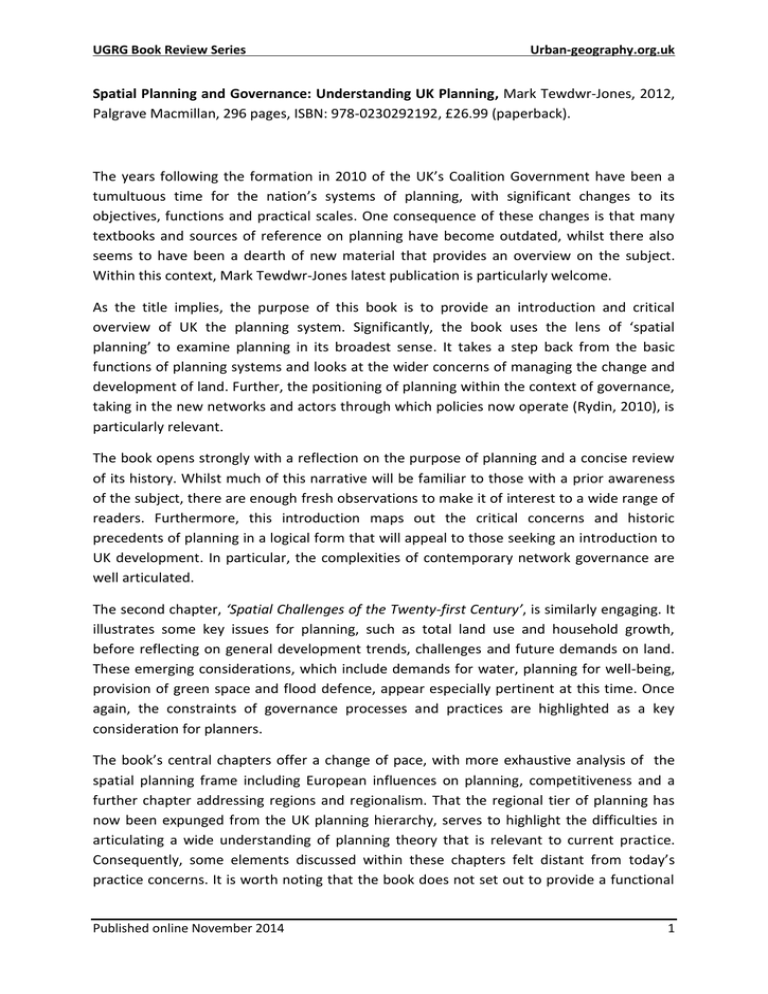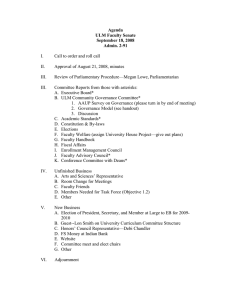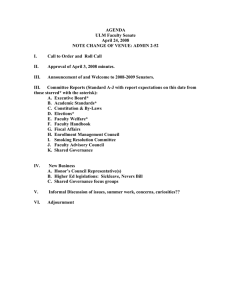Spatial Planning and Governance: Understanding UK Planning,
advertisement

UGRG Book Review Series Urban-geography.org.uk Spatial Planning and Governance: Understanding UK Planning, Mark Tewdwr-Jones, 2012, Palgrave Macmillan, 296 pages, ISBN: 978-0230292192, £26.99 (paperback). The years following the formation in 2010 of the UK’s Coalition Government have been a tumultuous time for the nation’s systems of planning, with significant changes to its objectives, functions and practical scales. One consequence of these changes is that many textbooks and sources of reference on planning have become outdated, whilst there also seems to have been a dearth of new material that provides an overview on the subject. Within this context, Mark Tewdwr-Jones latest publication is particularly welcome. As the title implies, the purpose of this book is to provide an introduction and critical overview of UK the planning system. Significantly, the book uses the lens of ‘spatial planning’ to examine planning in its broadest sense. It takes a step back from the basic functions of planning systems and looks at the wider concerns of managing the change and development of land. Further, the positioning of planning within the context of governance, taking in the new networks and actors through which policies now operate (Rydin, 2010), is particularly relevant. The book opens strongly with a reflection on the purpose of planning and a concise review of its history. Whilst much of this narrative will be familiar to those with a prior awareness of the subject, there are enough fresh observations to make it of interest to a wide range of readers. Furthermore, this introduction maps out the critical concerns and historic precedents of planning in a logical form that will appeal to those seeking an introduction to UK development. In particular, the complexities of contemporary network governance are well articulated. The second chapter, ‘Spatial Challenges of the Twenty-first Century’, is similarly engaging. It illustrates some key issues for planning, such as total land use and household growth, before reflecting on general development trends, challenges and future demands on land. These emerging considerations, which include demands for water, planning for well-being, provision of green space and flood defence, appear especially pertinent at this time. Once again, the constraints of governance processes and practices are highlighted as a key consideration for planners. The book’s central chapters offer a change of pace, with more exhaustive analysis of the spatial planning frame including European influences on planning, competitiveness and a further chapter addressing regions and regionalism. That the regional tier of planning has now been expunged from the UK planning hierarchy, serves to highlight the difficulties in articulating a wide understanding of planning theory that is relevant to current practice. Consequently, some elements discussed within these chapters felt distant from today’s practice concerns. It is worth noting that the book does not set out to provide a functional Published online November 2014 1 UGRG Book Review Series Urban-geography.org.uk guide to planning, in the mould of Cullingworth and Nadin’s, (2006) “Town and Country Planning in the UK”, but rather aims to provide a broader discussion of the key issues. This only serves to illustrate how overdue a basic planning text book, reflecting recent policy reforms, really is. Fortunately, the formatting of the book, which uses broad themes on the subject rather than a chronological approach, allows the reader to dip in and out of sections according to their own interest. Thus, tucked between discussion of Regions and Europeanization, Tewdwr-Jones offers a succinct summary of some recent UK planning policy reforms, including the condensed National Planning Policy Framework (NPPF). A chapter addressing sub-regionalism and city-regions is similarly relevant, with timely analysis of partnerships, funding and the new Local Enterprise Partnerships (LEP’s); which illustrates a new governance institution that planning engages with to promote development. Furthermore, an exploration of local planning policy, provides an interesting context to the recent (re)emergence of localism. However, I felt that the book would have benefitted from some illustration of contemporary planning system structures, to make it clearer how these institutions interact, including the now divergent systems between England, Wales, Scotland and Northern Ireland. Of course, it may be that there is no clear structure and what we presently have is a “bowl of spaghetti”, as famously described by Lord Rooker (cited by Johnstone and Whitehead, 2004). The final two chapters will have a broader relevance beyond those seeking introduction to the subject matter. The topic of “Spatial Planning, Governance and the State” attempts to deconstruct the forms of governance which are implicit in UK planning. The resulting text is highly theoretical and rather dense, but for those with a specific interest in governance it offers some noteworthy insights. The concluding chapter provides a satisfying summation of many of the book’s themes, and introduces some interesting roles for planning in the future, to provide “strategic intelligence”(p.242) with the aim of promoting “territorial and spatial resilience” (p.244). Tewdwr-Jones’ book offers an accessible, but thought-provoking examination of UK planning practice that will stimulate the reader to consider the topic from some interesting perspectives. In particular, it directs some overdue attention on the wider networks of governance to planning. It seems likely that this book will provide a valuable reference to planning students for many years to come, whilst also offering interest to scholars of planning and urban geography. Jonathan R.L. Clarke University of Warwick Published online November 2014 2 UGRG Book Review Series Urban-geography.org.uk References Cullingworth, J.B. and Nadin, V. (2006) Town and country planning in the UK. 14th ed.London: Routledge. Johnstone, C. & Whitehead, M. (Eds) (2004) New Horizons in British Urban Policy: Perspectives on New Labour’s Urban Renaissance (Aldershot, Ashgate) Rydin, Y. (2010) Governing for sustainable urban development. London: Earthscan. Published online November 2014 3


